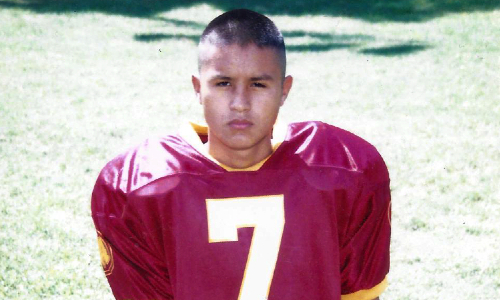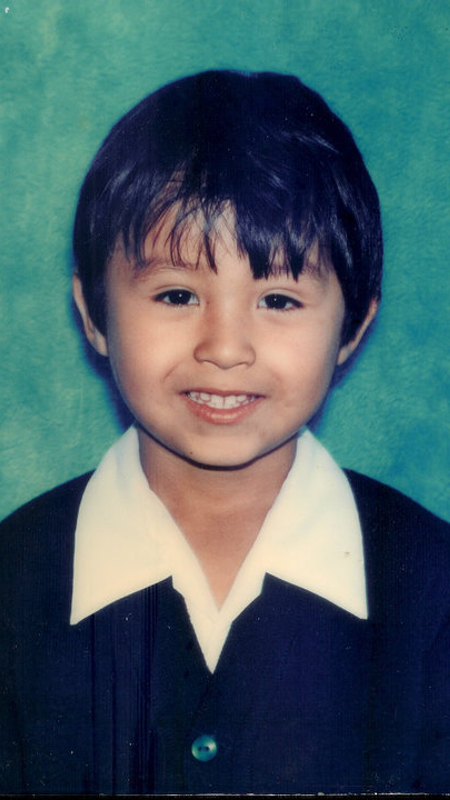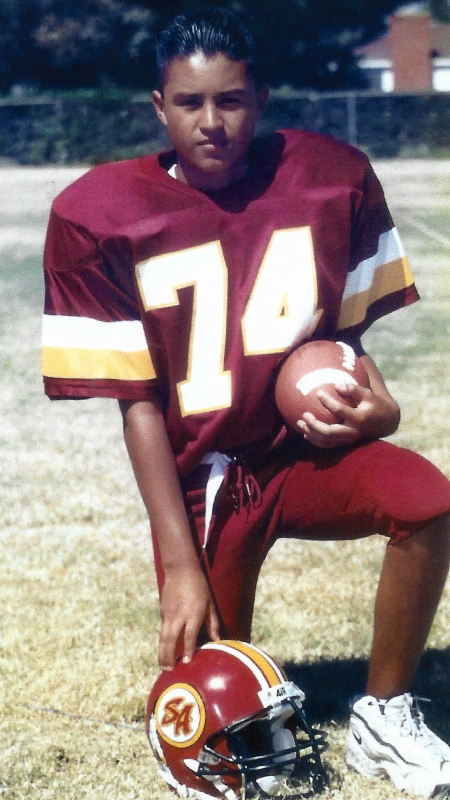Born in Mexico City, Luis Salazar and his family moved to the U.S. when he was eight years old. Luis was an extremely gifted athlete who excelled in track and field and youth football from the time he was 10 years old. Luis was known for being the hardest hitter on every team he played on. When he was in 8th grade, Luis began exhibiting behavioral changes, mood swings, and uncharacteristic violent tendencies. He took his life when on August 23rd, 1999 at age 14. Luis’ brain was not studied for research but his older brother Victor came to learn about the effects of concussions and CTE and believes his brother’s changes may have been related to his head trauma. Victor is sharing Luis’ story to educate other families on the dangers of repetitive head impacts and concussions.

Warning: This story contains mentions of suicide and may be triggering to some readers.
Luis Gerardo Salazar was born on April 2, 1985 in Mexico City and moved to the United States when he was eight years old with our family. He was the middle of three children with one brother and one sister. He was very athletic from the time he was young. He started playing football when he was 10 years old, and he was also a very talented track and field runner in middle school. When Luis was in 7th grade, he attended the Junior Olympics in Florida and finished second in the nation for the 100-meter run.

He was always the captain of the football team wherever he would play. He was known for being the hardest hitter during drills, especially in the infamous “bull in the ring” drill.
At the time, nobody knew how dangerous it was to be hit in the head repeatedly. My parents started noticing my brother’s behavior change when he was in 8th grade. He had radical mood changes and would show signs of violence. On August 23, 1999, my brother took his own life at home. He was 14 years old.
We later found out that on the morning of his death, he had been challenged by the varsity football team at the high school he was set to attend in a month to do the “hit” drill and he beat them all. We also learned Luis had been violent in parties in the prior six months. If anyone would make him upset, he would get very violent, which was very unlike him. He was loved by his peers, teachers, coaches, and family. He was one of a kind. If I had a dollar for every time someone told me “Your brother was my best friend,” I would be a millionaire.

The main reason why I want to share my brother’s story is to help other families like ours. There might be families out there who have no idea why someone who is a great athlete, popular, and who has a lot of friends, would choose to take their own life. I know our family had no answers for a long time. I follow pro wrestling, and so Chris Benoit’s death opened my eyes to what CTE is and how it can affect people. I started reading about concussions and CTE and that’s when I finally knew what had happened to my brother. I knew that his mood and entire personality changed because of the repeated hits to the head he suffered playing football. At the time he played, it was encouraged to be violent and hit hard. No one knew about the dangers of head hits.
Families need to be aware of the impact concussions and repeated hits to the head can have on their children. Studies have shown that people with concussion histories have an increased risk of mental health issues, including suicide. If we knew what we knew now, maybe we could have helped Luis get help and treatment and he’d still be here with us. My heart goes out to other former players like Luis who may be struggling due to the hits they took. Know you are not alone. Your family and friends love you and want you here with us.
If you are struggling to cope and would like some emotional support, call the Suicide & Crisis Lifeline at 988 to connect with a trained counselor. It’s free, confidential, and available to everyone in the United States. You do not have to be suicidal to call. If you’re not comfortable talking on the phone, consider using the Lifeline Crisis Chat at 988lifeline.org/chat.

